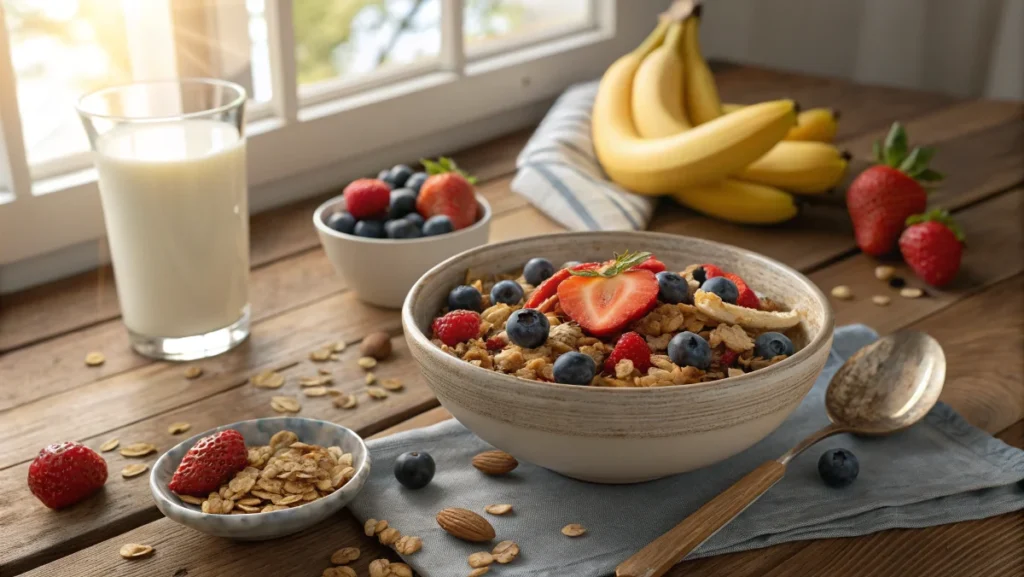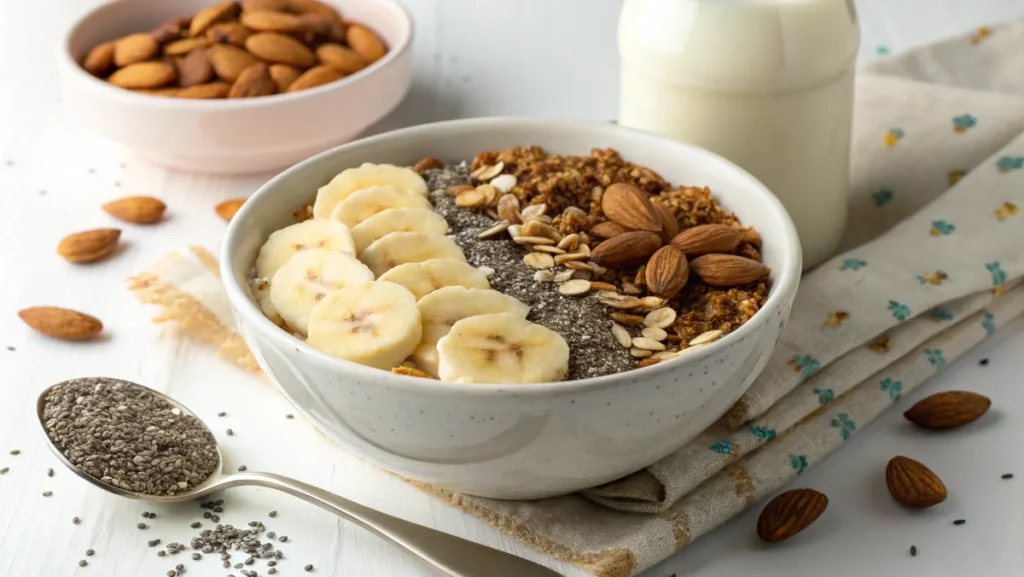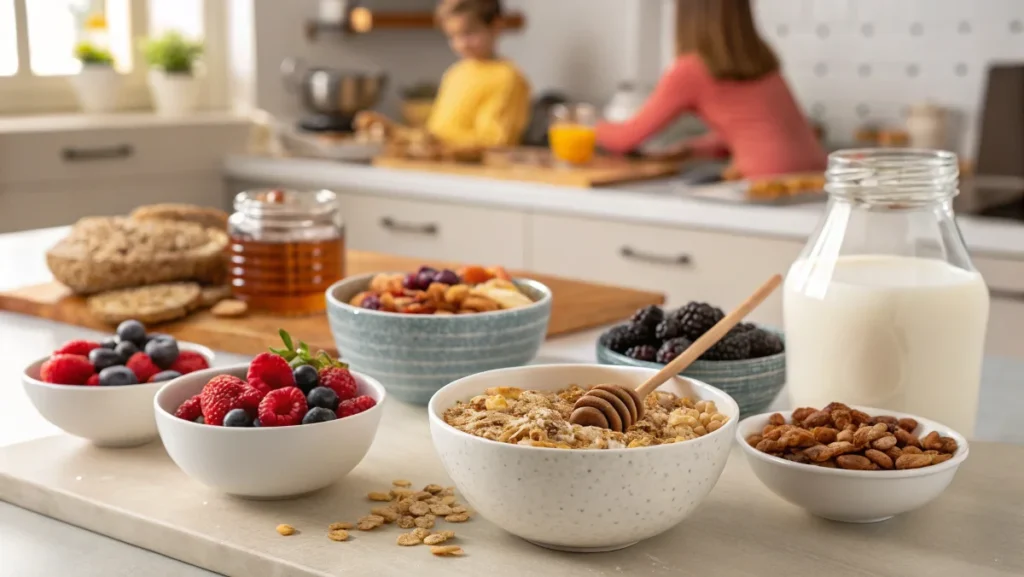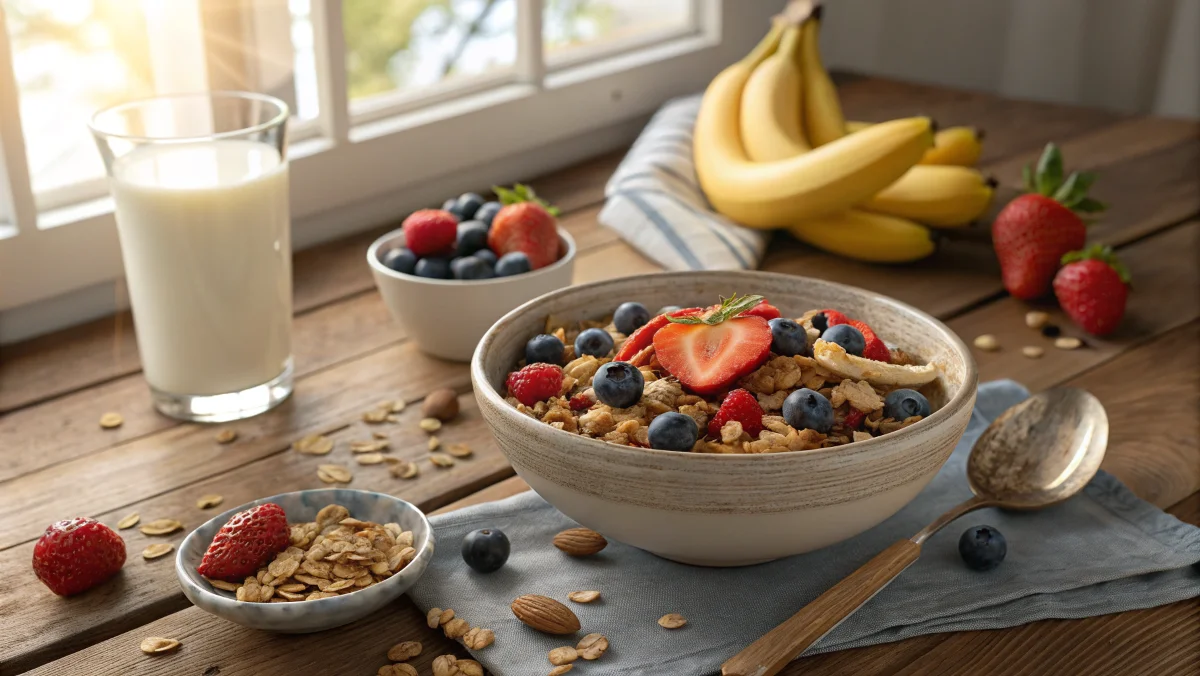Breakfast is one of the most important meals of the day, and starting with a bowl of cereal can be a fantastic way to kickstart your morning. Loved for its convenience, versatility, and nutritional value, the benefits of eating breakfast cereal have made it a staple in homes worldwide. But there’s more to cereal than just its simplicity. It can be a powerhouse of essential nutrients, support weight management, and cater to various dietary preferences. For more insights, check out The Ultimate Guide to Breakfast Cereal: Best Types, Benefits, and Recipes. Incorporating cereal into your daily routine can transform your mornings for the better.

Table of Contents
What Is Breakfast Cereal?
– Definition and Popularity
Breakfast cereal refers to grain-based food products that are typically consumed as the first meal of the day. They are usually served with milk, yogurt, or plant-based alternatives like almond or soy milk. Cereal can be sweetened or unsweetened, and the variety available means there’s something to suit everyone’s preferences and nutritional needs.
From crunchy granola to chewy oats and colorful flakes, cereals come in numerous forms. Their popularity is largely due to their convenience, as they require minimal preparation time. Whether you’re rushing out the door or enjoying a relaxed morning, breakfast cereal is a quick, no-fuss option that delivers energy and nutrition.
– History of Breakfast Cereal
The concept of breakfast cereal began in the late 1800s when Dr. John Harvey Kellogg introduced it as a health food. The first cereals were simple, made from whole grains, and marketed as easy-to-digest options for those seeking a healthier diet. Over time, breakfast cereals evolved into a global phenomenon, appealing to both children and adults.
Today, breakfast cereals are produced by countless brands worldwide, offering options that cater to diverse needs. From gluten-free and low-sugar cereals to fortified varieties packed with essential vitamins and minerals, the cereal aisle is a treasure trove of choices.
Nutritional Benefits of Breakfast Cereal
– Rich Source of Fiber
Whole-grain cereals are an excellent source of dietary fiber, an essential nutrient for maintaining a healthy digestive system. Fiber helps regulate bowel movements, lowers cholesterol levels, and promotes heart health. Oat-based cereals, in particular, are rich in beta-glucan, a type of soluble fiber known to support healthy cholesterol levels.
Fiber also plays a role in maintaining blood sugar levels. By slowing the absorption of sugar into the bloodstream, it helps prevent spikes and crashes in energy levels, keeping you energized throughout the morning.
– Packed with Essential Vitamins and Minerals
Fortified cereals are a convenient way to get essential nutrients that may be missing from your diet. Common nutrients added to cereals include:
- Vitamin D: Supports bone health and immune function.
- B Vitamins: Crucial for energy production and brain function.
- Iron: Helps transport oxygen throughout the body.
- Calcium: Promotes strong bones and teeth.
For those with dietary restrictions or specific nutritional needs, fortified cereals can help bridge the gap and ensure you’re getting adequate daily nutrients.
– Naturally Low in Fat and Cholesterol
Most cereals are naturally low in fat and cholesterol, making them a heart-healthy option. For individuals managing their cholesterol levels, whole-grain cereals like oats and bran can be particularly beneficial. When paired with low-fat milk or unsweetened plant-based milk, you can enjoy a satisfying, nutrient-rich breakfast without the guilt.

Supports Weight Management
– Low-Calorie Options for Weight Control
One of the best things about breakfast cereal is that it allows you to enjoy a satisfying meal without overloading on calories. Low-calorie cereals, such as bran flakes, oatmeal, or puffed rice, provide essential nutrients while helping you maintain a calorie deficit for weight loss.
– Keeps You Full and Satisfied
The high fiber content in many cereals promotes a feeling of fullness, which can help curb hunger and prevent overeating later in the day. This makes cereals an excellent choice for those trying to manage their appetite and stick to a healthy eating plan.
For even better results, pair your cereal with protein-rich toppings like Greek yogurt, nuts, or seeds. These additions not only enhance the flavor but also prolong the feeling of satiety.
– Supports Consistent Eating Habits
A healthy breakfast sets the tone for the day and encourages consistent eating patterns. By starting your morning with a nutrient-rich cereal, you’re less likely to skip meals or indulge in unhealthy snacks later. For a unique twist on a wholesome breakfast, consider trying Cottage Cheese Pancakes to add variety and nutritional value to your routine.
Energy Boost to Start the Day
– Carbohydrates for Long-Lasting Energy
Breakfast cereals are packed with carbohydrates, which are the body’s primary source of energy. Consuming cereals made from whole grains ensures that you’re getting complex carbs that release energy slowly, keeping you fueled for longer.
– Quick and Convenient for Busy Mornings
In today’s fast-paced world, time is often a luxury. Breakfast cereal provides a quick, no-cook solution that’s perfect for busy mornings. Options like granola bars or single-serve cereal cups make it easy to enjoy a healthy breakfast on the go.
– Enhance with Healthy Toppings
Cereals offer a versatile base that can be paired with a wide variety of toppings. Fresh fruits like berries, bananas, and kiwi add natural sweetness and antioxidants. Nuts and seeds like almonds, walnuts, and chia seeds contribute healthy fats and protein for sustained energy.

Versatile and Convenient
– Fits Any Lifestyle or Dietary Preference
Breakfast cereals cater to virtually every dietary requirement. Whether you’re vegan, gluten-free, or following a low-carb diet, there’s a cereal that fits your needs. For example:
- Gluten-free cereals: Made with rice, corn, or quinoa for those with celiac disease or gluten sensitivity.
- Low-sugar cereals: Ideal for people managing diabetes or trying to cut back on added sugars.
- Vegan cereals: Free from animal-derived ingredients and compatible with plant-based diets.
– Customizable for Flavor and Nutrition
One of the most appealing aspects of cereal is how easy it is to customize. You can tailor it to your taste preferences by adding fresh fruits, spices like cinnamon, or a drizzle of honey. For an extra nutritional boost, mix in protein powder or seeds like flax and chia.
– A Meal Beyond Breakfast
While cereal is typically associated with breakfast, it’s also a great snack or even a light dinner option. Whether you enjoy it dry, with milk, or as part of a yogurt parfait, cereal offers flexibility that few other foods can match. For a creative and flourless breakfast alternative, you might enjoy Cottage Cheese Pancakes No Flour, which bring a protein-packed twist to your morning or snack time.
Breakfast Cereal for Different Dietary Needs
– Gluten-Free Options
For individuals with celiac disease or gluten sensitivity, breakfast cereals are available in gluten-free varieties made from grains like rice, corn, or quinoa. These options allow everyone to enjoy the benefits of cereal without worrying about digestive discomfort. Popular brands now include gluten-free labels to make choosing the right product easier.
– Vegan and Plant-Based Choices
Vegans and plant-based eaters can find cereals made without animal-derived ingredients. Options like granola, oats, and puffed rice pair perfectly with almond, soy, or oat milk for a dairy-free breakfast. Many plant-based cereals are fortified with nutrients like vitamin B12 and calcium to support vegan diets.
– Low-Sugar Choices for Diabetics
Managing diabetes doesn’t mean giving up breakfast cereal. Low-sugar or unsweetened varieties, paired with healthy toppings like nuts and berries, can provide a balanced meal without causing blood sugar spikes. Look for cereals with less than 5 grams of sugar per serving for optimal results.
Encourages Healthy Eating Habits
– Builds a Morning Routine
Incorporating breakfast cereal into your daily schedule can help establish a consistent morning routine. Starting your day with a structured, nutritious meal can positively impact your eating habits throughout the day.
– Promotes Mindful Eating
Breakfast cereal allows you to make thoughtful choices about your first meal of the day. Adding fresh fruits, nuts, or seeds encourages balanced nutrition and mindful eating, making it easier to maintain a healthy diet.
– Teaches Children Healthy Habits
Children learn by example, and starting their day with a nutritious bowl of cereal can set a positive tone for lifelong healthy eating. Fun shapes and flavors make cereals appealing to kids while still delivering essential nutrients. For another kid-friendly and nutritious breakfast idea, try Banana Cottage Cheese Pancakes that combine delightful flavors with a boost of protein and energy.
Helps Children Meet Nutritional Needs
– Supports Growth and Development
Children require a diet rich in essential vitamins and minerals to support their rapid growth and development. Fortified cereals provide nutrients like iron, calcium, and B vitamins, which are crucial for building strong bones, producing red blood cells, and maintaining energy levels.
– Appeals to Picky Eaters
Breakfast cereal is an easy way to ensure that even the pickiest eaters get their nutrients. Options with fun shapes, vibrant colors, or natural sweetness appeal to children, making breakfast enjoyable and stress-free for parents.
– Convenient for Busy Families
For families with hectic mornings, breakfast cereal is a lifesaver. A bowl of cereal takes just minutes to prepare, making it a reliable choice for ensuring kids get a healthy start to their day.
Potential Drawbacks to Watch Out For
– High Sugar Content in Some Brands
Not all cereals are created equal. Many commercial cereals are loaded with added sugars, which can contribute to weight gain, energy crashes, and long-term health issues like type 2 diabetes. Always check the nutrition label and opt for cereals with 10 grams or less of sugar per serving.
– Processed Ingredients and Additives
Some cereals contain artificial flavors, preservatives, or refined grains, which can reduce their nutritional value. Choosing whole-grain options with minimal additives ensures you’re getting the most health benefits.
– Portion Control Challenges
While cereals are convenient, it’s easy to overeat when pouring directly from the box. Measuring your servings can help you stick to the recommended portion size and avoid excessive calorie intake.
Tips for Choosing the Best Breakfast Cereal
– Prioritize Whole Grains
When shopping for breakfast cereal, always look for products made from whole grains. Whole grains are richer in fiber, vitamins, and minerals than refined grains, providing long-lasting energy and better overall nutrition.
– Check the Sugar Content
Avoid cereals with added sugars or artificial sweeteners. Instead, choose unsweetened or naturally sweetened options and add your own toppings like fruits or honey for flavor.
– Focus on Fiber and Protein
A good breakfast cereal should have at least 3 grams of fiber and 5 grams of protein per serving. Fiber supports digestion, while protein keeps you feeling full longer, helping you avoid unnecessary snacking.
– Experiment with Additions
Elevate the nutritional profile of your cereal by adding healthy toppings:
- Fruits: Fresh berries, bananas, or dried apricots for natural sweetness.
- Nuts and Seeds: Almonds, walnuts, chia seeds, or flaxseeds for healthy fats and protein.
- Spices: A dash of cinnamon or nutmeg to enhance flavor without extra calories.
FAQs: Benefits of Breakfast Cereal
Can breakfast cereal be eaten as a snack?
Yes, breakfast cereal can be eaten as a snack! It’s a versatile option that works well beyond breakfast. Dry cereal is a convenient and portable snack, perfect for on-the-go moments. For a more satisfying treat, pair your cereal with yogurt, fresh fruit, or nuts. Opt for whole-grain, low-sugar cereals to keep your snack nutritious and filling. For more creative and wholesome snack ideas, explore Cottage Cheese Recipes that offer delicious and nutritious options for any time of the day.
What are the benefits of breakfast cereals?
Breakfast cereals offer numerous benefits, including:
- Convenience: They’re quick and easy to prepare.
- Nutritional Value: Many cereals are fortified with essential vitamins and minerals like iron, calcium, and B vitamins.
- High in Fiber: Whole-grain cereals support digestive health and keep you full longer.
- Versatility: They can be customized with milk, yogurt, or toppings like fruits and seeds to suit your preferences.
- Energy Boost: The carbohydrates in cereals provide a quick source of energy to start your day.
What is the healthiest breakfast cereal to eat?
The healthiest breakfast cereals are those made from whole grains, with minimal added sugar and high fiber content. Examples include:
- Oatmeal: Packed with fiber and heart-healthy nutrients.
- Bran Flakes: Rich in fiber and low in calories.
- Muesli: A mix of oats, dried fruits, and nuts, offering balanced nutrition.
- Shredded Wheat: Made from 100% whole grain and free of added sugars.
Look for cereals with at least 3 grams of fiber and less than 10 grams of sugar per serving.
What does cereal do to your body?
Breakfast cereal can positively impact your body when chosen wisely:
- Provides Energy: Carbohydrates in cereal offer a quick and sustained energy boost.
- Supports Digestion: High-fiber cereals promote gut health and regular bowel movements.
- Boosts Nutrient Intake: Fortified cereals supply essential vitamins and minerals, supporting bone health, energy metabolism, and overall well-being.
- Helps with Weight Management: Low-calorie, high-fiber cereals keep you full longer, helping reduce overeating.
However, consuming sugary or highly processed cereals in excess can lead to energy crashes and weight gain.
Conclusion: The Benefits of Eating Breakfast Cereal
Breakfast cereal offers a versatile, convenient, and nutritious way to start your day. Whether you’re looking for a quick meal to fuel your morning, a healthy option to support weight management, or a fun breakfast to encourage healthy eating in kids, cereal delivers. By choosing the right type and pairing it with wholesome toppings, you can transform your breakfast into a nutrient-rich powerhouse. For some inspiration, check out the Top 10 Best Cereals for a Delicious and Fun Breakfast to find options that cater to every taste and nutritional need.

